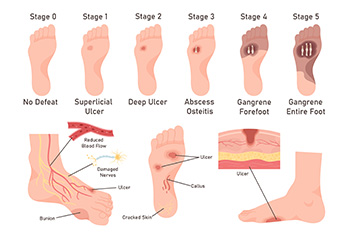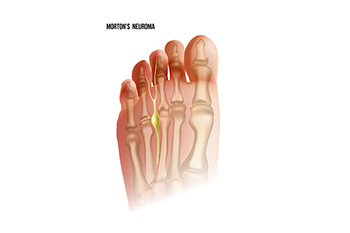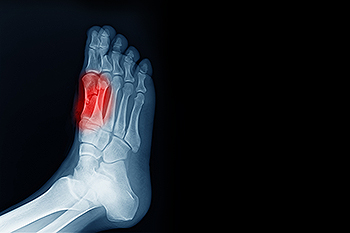Connect With Us
Blog
Items filtered by date: September 2025
Safeguarding the Diabetic Foot from Ulcers

Ulcers of the foot are a common yet preventable concern for people with diabetes. When circulation is reduced and sensation is diminished, even a small blister or cut can turn into a larger problem. The key to prevention lies in daily habits that protect and preserve skin integrity. Washing and drying the feet thoroughly, moisturizing to prevent cracking, and inspecting the toes, soles, and heels each day can make a difference. Choosing shoes that fit well and avoiding barefoot walking also helps to reduce risk. Nail trimming should be done carefully to avoid injury, and any signs of redness or swelling should be addressed early. Routine checkups with a podiatrist are an important layer of protection, since problems may not always be obvious. If you are living with diabetes, it is suggested that you visit a podiatrist regularly to lower your risk of developing foot ulcers.
Diabetic foot care is important in preventing foot ailments such as ulcers. If you are suffering from diabetes or have any other concerns about your feet, contact David Carmack, DPM from Texas. Our doctor can provide the care you need to keep you pain-free and on your feet.
Diabetic Foot Care
Diabetes affects millions of people every year. The condition can damage blood vessels in many parts of the body, especially the feet. Because of this, taking care of your feet is essential if you have diabetes, and having a podiatrist help monitor your foot health is highly recommended.
The Importance of Caring for Your Feet
- Routinely inspect your feet for bruises or sores.
- Wear socks that fit your feet comfortably.
- Wear comfortable shoes that provide adequate support.
Patients with diabetes should have their doctor monitor their blood levels, as blood sugar levels play such a huge role in diabetic care. Monitoring these levels on a regular basis is highly advised.
It is always best to inform your healthcare professional of any concerns you may have regarding your feet, especially for diabetic patients. Early treatment and routine foot examinations are keys to maintaining proper health, especially because severe complications can arise if proper treatment is not applied.
If you have any questions, please feel free to contact our office located in Marble Falls, TX . We offer the newest diagnostic and treatment technologies for all your foot care needs.
Stretching The Toes
 People who are interested in achieving their best performance in athletics are often aware of the impact wearing the right shoe can have. Research has indicated sprinters, runners, and joggers have toes that are strong. The big toe is considered to be one of the most important parts of the foot, and it is used in athletic movements. This part of the foot needs to be flexible as it strikes the ground with astounding force. There are specific exercises that can improve the strength of the big toe. These can include toe curls and calf raises with emphasis on the big toe. Range of motion can be improved while standing on a tennis or golf ball, in addition to massaging the sole of the foot. If you would like more information about the benefits of stretching the feet, please consult with a podiatrist.
People who are interested in achieving their best performance in athletics are often aware of the impact wearing the right shoe can have. Research has indicated sprinters, runners, and joggers have toes that are strong. The big toe is considered to be one of the most important parts of the foot, and it is used in athletic movements. This part of the foot needs to be flexible as it strikes the ground with astounding force. There are specific exercises that can improve the strength of the big toe. These can include toe curls and calf raises with emphasis on the big toe. Range of motion can be improved while standing on a tennis or golf ball, in addition to massaging the sole of the foot. If you would like more information about the benefits of stretching the feet, please consult with a podiatrist.
Why Stretching Is Important for Your Feet
Stretching the feet is a great way to prevent injuries. If you have any concerns with your feet consult with David Carmack, DPM from Texas. Our doctor will assess your condition and provide you with quality foot and ankle treatment.
Stretching the Feet
Stretching the muscles in the foot is an important part in any physical activity. Feet that are tight can lead to less flexibility and make you more prone to injury. One of the most common forms of foot pain, plantar fasciitis, can be stretched out to help ease the pain. Stretching can not only ease pain from plantar fasciitis but also prevent it as well. However, it is important to see a podiatrist first to determine if stretching is right for you. Podiatrists can also recommend other ways to stretch your feet. Once you know whether stretching is right for you, here are some excellent stretches you can do.
- Using a foam roller or any cylindrical object (a water bottle or soda can will do), roll the object under your foot back and forth. You should also exert pressure on the object. Be sure to do this to both feet for a minute. Do this exercise three times each.
- Similar to the previous exercise, take a ball, such as a tennis ball, and roll it under your foot while seated and exert pressure on it.
- Grab a resistance band or towel and take a seat. If you are using a towel, fold it length wise. Next put either one between the ball of your foot and heel and pull with both hands on each side towards you. Hold this for 15 seconds and then switch feet. Do this three times for each foot.
- Finally hold your big toe while crossing one leg over the other. Pull the toe towards you and hold for 15 seconds. Once again do this three times per foot.
It is best to go easy when first stretching your foot and work your way up. If your foot starts hurting, stop exercising to ice and rest the foot. It is advised that you then see a podiatrist for help.
If you have any questions please contact our office located in Marble Falls, TX . We offer the newest diagnostic and treatment technologies for all your foot and ankle needs.
Morton's Neuroma and a Podiatrist's Help

Morton’s neuroma is a painful condition that affects the nerves between the toes, most commonly between the third and fourth toes. It occurs when the tissue surrounding the nerve thickens, leading to irritation and discomfort. Causes include wearing tight or high heeled shoes, repetitive stress from activities like running, and structural foot abnormalities such as bunions or hammertoes. Risk factors include high arches, flat feet, and participating in high impact sports. Additionally, symptoms often involve burning pain, tingling, or numbness in the ball of the foot that may worsen with walking or standing. A podiatrist can provide a diagnosis, recommend proper footwear, prescribe orthotics, and offer treatments to reduce pain and restore mobility. If you have pain in this part of your foot, it is suggested that you consult a podiatrist who can accurately diagnose and treat what may be going on.
Morton’s neuroma is a very uncomfortable condition to live with. If you think you have Morton’s neuroma, contact David Carmack, DPM of Texas. Our doctor will attend to all of your foot care needs and answer any of your related questions.
Morton’s Neuroma
Morton's neuroma is a painful foot condition that commonly affects the areas between the second and third or third and fourth toe, although other areas of the foot are also susceptible. Morton’s neuroma is caused by an inflamed nerve in the foot that is being squeezed and aggravated by surrounding bones.
What Increases the Chances of Having Morton’s Neuroma?
- Ill-fitting high heels or shoes that add pressure to the toe or foot
- Jogging, running or any sport that involves constant impact to the foot
- Flat feet, bunions, and any other foot deformities
Morton’s neuroma is a very treatable condition. Orthotics and shoe inserts can often be used to alleviate the pain on the forefront of the feet. In more severe cases, corticosteroids can also be prescribed. In order to figure out the best treatment for your neuroma, it’s recommended to seek the care of a podiatrist who can diagnose your condition and provide different treatment options.
If you have any questions, please feel free to contact our office located in Marble Falls, TX . We offer the newest diagnostic and treatment technologies for all your foot care needs.
Reminder: When Was the Last Time...?
Non-Injury Causes of Toe Pain

Toe pain does not always come from an injury and can often result from underlying conditions that affect the feet. Skin problems are a common source of toe pain. Corns, calluses, blisters, warts, athlete’s foot, and ingrown toenails may cause discomfort, redness, or swelling. Infections can also lead to painful changes in the toenails or surrounding skin. Joint issues, such as bunions, bunionettes, hammer toes, arthritis, or gout, can make walking difficult and alter toe alignment. Pain may also develop in the ball of the foot from metatarsalgia. Nerve problems such as Morton’s neuroma, tarsal tunnel syndrome, or neuropathy can produce tingling, burning, or numbness in the toes. Additionally, circulatory changes, often seen in people with diabetes, can further contribute to nerve damage and pain. A podiatrist can diagnose the source of your toe pain and provide effective treatment, depending on the condition. If you are experiencing toe pain, it is suggested that you schedule an appointment with a podiatrist for appropriate treatment.
Toe pain can disrupt your daily activities. If you have any concerns, contact David Carmack, DPM of Texas. Our doctor can provide the care you need to keep you pain-free and on your feet.
What Causes Toe Pain?
Most severe toe pain is caused due to a sports injury, trauma from dropping something heavy on the toe, or bumping into something rigid. Other problems can develop over time for various reasons.
Toe pain can be caused by one or more ailments. The most common include:
- Trauma
- Sports injury
- Wearing shoes that are too tight
- Arthritis
- Gout
- Corns and calluses
- Hammertoe
- Bunions
- Blisters
- Ingrown toenails
- Sprains
- Fractures (broken bones)
- Dislocations
When to See a Podiatrist
- Severe pain
- Persistent pain that lasts more than a week
- Signs of infection
- Continued swelling
- Pain that prevents walking
Diagnosis
In many cases the cause of toe pain is obvious, but in others, a podiatrist may want to use more advanced methods to determine the problem. These can range from simple visual inspections and sensation tests to X-rays and MRI scans. Prior medical history, family medical history, and any recent physical traumatic events will all be taken into consideration for a proper diagnosis.
Treatment
Treatments for toe pain and injuries vary and may include shoe inserts, padding, taping, medicines, injections, and in some cases, surgery. If you believe that you have broken a toe, please see a podiatrist as soon as possible.
If you have any questions please contact our office located in Marble Falls, TX . We offer the newest diagnostic and treatment technologies for all your foot and ankle needs.
Sesamoiditis and the Role of a Podiatrist

Sesamoiditis is a painful condition that affects the small sesamoid bones located beneath the big toe joint. These bones help with movement and weight bearing, but can become inflamed from repetitive stress or injury. Common causes include activities that place pressure on the forefoot, such as running, dancing, or wearing high-heeled shoes. Risk factors include foot structure abnormalities, overuse, and improper footwear. Symptoms include pain under the big toe, swelling, and difficulty pushing off while walking. A podiatrist can diagnose sesamoiditis, provide customized treatment options, such as padding, orthotics, and activity modifications, and offer long-term solutions for relief. If you are experiencing forefoot pain, it is suggested that you consult a podiatrist who can accurately diagnose and treat the problem.
Sesamoiditis is an unpleasant foot condition characterized by pain in the balls of the feet. If you think you’re struggling with sesamoiditis, contact David Carmack, DPM of Texas. Our doctor will treat your condition thoroughly and effectively.
Sesamoiditis
Sesamoiditis is a condition of the foot that affects the ball of the foot. It is more common in younger people than it is in older people. It can also occur with people who have begun a new exercise program, since their bodies are adjusting to the new physical regimen. Pain may also be caused by the inflammation of tendons surrounding the bones. It is important to seek treatment in its early stages because if you ignore the pain, this condition can lead to more serious problems such as severe irritation and bone fractures.
Causes of Sesamoiditis
- Sudden increase in activity
- Increase in physically strenuous movement without a proper warm up or build up
- Foot structure: those who have smaller, bonier feet or those with a high arch may be more susceptible
Treatment for sesamoiditis is non-invasive and simple. Doctors may recommend a strict rest period where the patient forgoes most physical activity. This will help give the patient time to heal their feet through limited activity. For serious cases, it is best to speak with your doctor to determine a treatment option that will help your specific needs.
If you have any questions, please feel free to contact our office located in Marble Falls, TX . We offer the newest diagnostic and treatment technologies for all your foot care needs.
Blog Archives
- December 2025
- November 2025
- October 2025
- September 2025
- August 2025
- July 2025
- June 2025
- May 2025
- April 2025
- March 2025
- February 2025
- January 2025
- December 2024
- November 2024
- October 2024
- September 2024
- August 2024
- July 2024
- June 2024
- May 2024
- April 2024
- March 2024
- February 2024
- January 2024
- December 2023
- November 2023
- October 2023
- September 2023
- August 2023
- July 2023
- June 2023
- May 2023
- April 2023
- March 2023
- February 2023
- January 2023
- December 2022
- November 2022
- October 2022
- September 2022
- August 2022
- July 2022
- June 2022
- May 2022

